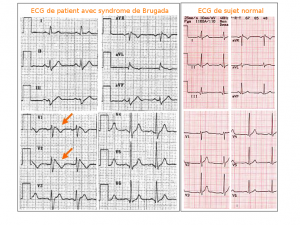
Brugada Syndrome is a serious but rare condition which affects the flow of electrical impulses through the brain. It can lead to the heart pumping too fast. These unusually rapid heartbeats – also called a ventricular fibrillation – can in some cases be life threatening.
A diagnosis of Brugada Syndrome is made after a thorough examination of the person's medical history and physical examination. The exact cause is still unknown, though a number of factors can contribute to this condition. The disease has no treatment and it tends to run its course without the need for medical treatment or medication. However, the symptoms of this condition can be relieved by taking medication prescribed by a doctor.
The signs and symptoms of Brugada Syndrome may include a sudden and sharp increase in the amount of heart rate and the severity of the symptoms will depend on this change. The most common symptom of this condition is chest pain that is either short term or intermittent and has a sharp pain on the right side of the chest. In some people, they experience a feeling of choking or difficulty breathing.
Other common symptoms of Brugada Syndrome are headaches and fatigue, and shortness of breath. If left untreated, these symptoms may become more severe and can cause permanent damage to the body's delicate and vital organs. One of the first steps to treating this condition is to identify the cause. Doctors are still trying to determine whether it is caused by abnormalities of the heart or cardiac arrhythmias.
If doctors are unable to determine the cause of the condition, doctors may refer people for further tests, such as electrocardiogram, X-rays and ultrasound. These tests help doctors diagnose the disorder and also determine if the condition is being caused by another condition.
Treatment for Brugada Syndrome includes medicines that can relieve the symptoms
These medicines can include beta-blockers, which slow the heartbeat, anti-convulsants which relieve the discomfort from spasms in the brain, and nitroglycerin which helps to increase blood flow and oxygen supply to the body's tissues.
When people with Brugada Syndrome suffer from ventricular fibrillation, they should also be given medications that make their hearts work harder and faster. This is especially important for people who have had a heart attack or suffered a heart attack while at work or who are pregnant. These medications help to reduce the possibility of death due to ventricular fibrillation. In some cases, people with the condition may require surgery, however this is not necessary unless the symptoms are particularly severe.
The best way to treat Brugada Syndrome is to get diagnosed early so that the condition does not worsen
Early treatment can help patients avoid dangerous complications and may also reduce the risks of death.
There are some people who respond well to short-term treatments. These treatments are called "first-line" treatments. These treatments include using beta-blockers. They can be taken in combination with other medicines that target the underlying causes of the problem.
For long term treatments, doctors may consider prescribing medication that can provide temporary relief. Although these medicines may provide some relief, they will not cure the condition permanently.
People with the condition are often treated by diet and exercise. A healthy and balanced diet can help prevent problems from developing and can help improve the quality of life of people with this disease.
People with Brugada Syndrome are often advised to eat foods that are low in fat and contain a lot of protein. To learn more about treatments and ways to treat this disease, you can consult your doctor.